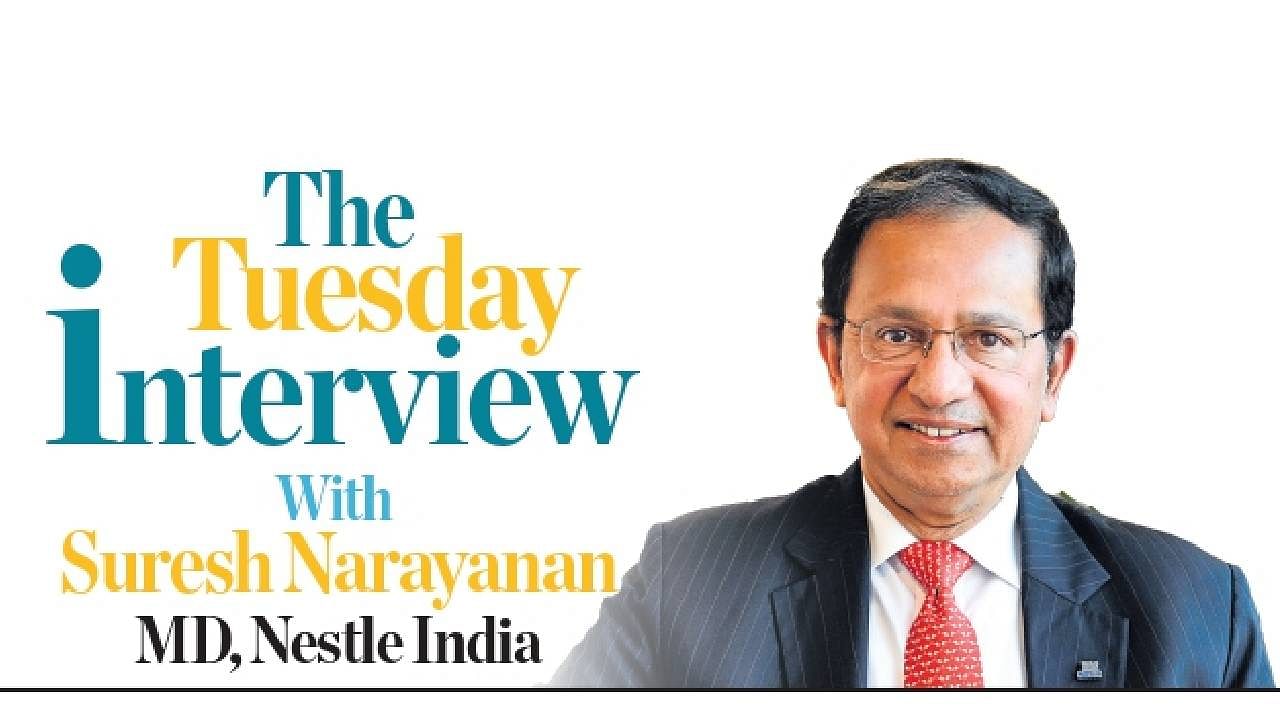
Chairman and MD of FMCG major Nestle India Ltd Suresh Narayanan.
Credit: DH Illustration
Demand growth for fast-moving consumer goods in rural India has slowed down, according to Suresh Narayanan, the Chairman and Managing Director of FMCG major Nestle India Ltd. In an interview with DH’s Arup Roychoudhury, Narayanan said El-Nino conditions remain a big factor in shaping the trajectory of rural demand and overall inflation. Speaking on the sidelines of the World Coffee Conference in Bengaluru, Narayanan discussed the impact of inflationary pressure on the upcoming festive season. Excerpts.
How has 2023 been so far for you, and what are your expectations in 2024?
In 21 out of the 26 quarters gone by, we have posted double-digit growth. I think that journey has continued into 2023 as well. In the first half, our turnover has grown by 18 per cent, and we have also had profits upwards of 30%. It has been, of course, at a time when food inflation has been high. For the company, the way inflation has impacted us, if you take 2019, 2020, and 2021, three years put together, is less than the inflation in 2022, where it was crossing 20 per cent for us. It was a difficult time in terms of trying to match affordability, value, penetration, and input costs. This year looks a little bit better, but again, one doesn’t know what impact the El Nino and monsoon will have on crops. There are still a few difficult questions there.
With inflation and an uneven monsoon, how is rural demand?
Our rural share has been fairly stable, at around 20 per cent of total demand. We have some very encouraging growth as far as rural areas are concerned. One factor is that our penetration levels are still relatively modest compared with other companies, as 80 per cent of our business is urban. What has happened is that the aspiration for brands has become very high. If you go to rural and semi-urban areas, you will find consumers asking for Nescafe, Maggi, KitKat, etc.
To that extent, rural demand has been stable, but the pace of growth has definitely come down. And I look to the future with cautious optimism, because if the impact on agriculture from El Nino and other global factors is really minimal, then we could be into a period of relatively more modest inflation. But if not, then clearly both availability and price will become constraints for the industry.
This will be the first festive season without Covid in three years. What are your expectations?
I expect a reasonably good season, probably as good as last year, maybe marginally better. But the kind of splurge that one might expect might not really happen because people are looking carefully at discretionary expenses. But the mood of the season might just influence some of the purchases, which is what I’m hoping it will. My internal projections are fairly positive. I don’t expect any kind of slowdown as far as festive spending is concerned. However, it has to be seen in the context of higher inflation and hyper-competition because everyone is fighting for that rupee from the consumer.
Apart from Nescafe Gold, which of the segments and products are you aiming your premiumisation strategy at?
We are looking strongly at the milk and nutrition portfolio. A lot of premiumisation has been taking place in that segment. Chocolates are getting a very strong makeover, and we just launched KitKat premium chocolates, which are doing well in the market. In Maggi, we are looking at strong premiumisation. We are also testing millet-based food products in Delhi called A+ Millets Masala.
When will you launch your millets portfolio in the rest of the country?
I would like to do it tomorrow. But we have to ramp up the production facilities. Which we are doing as we speak. Millets are hardier and more difficult to process. We have in our research and development centre a whole team that is working on new millet-based products. We believe that the time has come to look at alternative grains for the nutritional needs
of consumers.
What sectors do you plan to expand into?
There are two or three segments where we have started involving ourselves and are getting good responses. One is the health science space, where we have a slew of products. Then pet care is an area of deep engagement for the company. It’s a small business that we are looking to scale up. And the third one is breakfast cereal.
Are companies hedging all their bets on urban India?
Look, I think it’s too early to say if the rural uptick will be much stronger than it is today. All I can say as a company is that we have had a fairly strong run. We continue to grow in rural areas, but the pace of growth has clearly moderated.